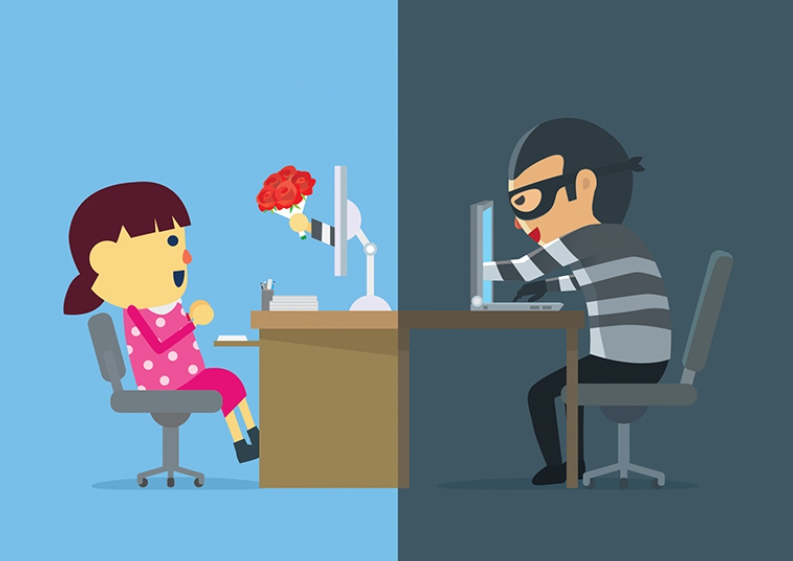Those looking for true love in the virtual world quickly encounter dubious platforms, professional scammers, and “match frustration.” With the following six tips, you can train your vigilance and recognize dangers before they become a threat to your existence and psyche.
Online dating – dangers in the search for love
Online dating is not only convenient, but also anonymous, age-independent, and accessible at any time. Whether you’re a teenager or already in your second half of life, online dating is an excellent way to meet strangers outside your own social circle and perhaps soon fall in love.
But certain supposed advantages also pose serious online dating risks: anonymity, anytime, and strangers. The internet is a hotbed of fraud and can quickly put your psyche to the test.
The fear of missing out on something or someone alone can cause enormous damage to one’s own emotional and mental world
6 tips to minimize online dating dangers
1. Personal data
You should carefully consider what personal information you disclose in your online profile. Whether it’s a dating site or a social media account, it’s better to be safe than sorry.
Experts advise not to publish too much, but also not too little. Age and photos should definitely be accurate, while date of birth, address, and current employer should not be disclosed.
A barely completed profile quickly appears unappealing, so it is better to introduce yourself with individual interests (music genre, quotes, travel, etc.) rather than publishing too much personal information.
You should also pay close attention to the privacy settings to protect your personal data.
2. Costs
Online dating also poses risks in terms of costs. While you can download, install, and use any app for free, these are generally basic versions. If you want to see who has liked you, sent you a message, or given you a SuperLike, you’ll need to purchase a subscription.
This isn’t inherently dubious, but subscription traps can lurk here, too. Therefore, when setting up a basic or trial subscription, you should always check carefully whether the duration and cancellation period are clearly stated. Otherwise, you’ll quickly slip into an unwanted subscription that’s difficult to get out of.
3. Erotic images and videos
“Send me a pic” is an all-too-common request for a cute or even naughty picture. However, you should be extremely careful when sending this type of image or video material. Stretching out in lingerie, provocative poses, or even nude photos can have fatal consequences if such images fall into the wrong hands.
Sending erotic photos to your (potential) partner is also not advisable. After all, you never know what they might do if the relationship ends .
4. Private and intimate information
Not only should private information like your date of birth, address, or bank account details not be disclosed, but discretion is also advisable when sharing sensitive and highly personal information. No matter how nice they are, you should always ask yourself whether the stranger you’re talking to really needs to know this information before you start typing away.
Does he or she need to know what setbacks you’ve already faced, why your marriage failed, what religion you follow, and why or whether you’ve ever had an abortion? Right, you only reveal such things when you’re more than just an online acquaintance.
In the worst case, trust is abused and the information is used against you.
5. “Tinder Fatigue”
While online dating was still exciting and new a few years ago, more and more users are now complaining about the stress that swiping and liking causes them.
Experts speak of this as “Tinder fatigue” or “dating burnout.” Many see online dating as their only chance to find true love. And as soon as you find someone, you start to worry about missing out on someone better. You hurt and get hurt—a vicious cycle.
As soon as you flirt with passion, your body and mind are flooded with endorphins, like a rush . As soon as that rush subsides, you need more and keep “Tindering.” You reject people, get rejected, ghost, get ghosted, behave unfairly, and are treated unfairly. Online dating can trigger such stress that frustration and overwhelm become noticeable.
6. First Date
You’ve exchanged ideas, gotten to know each other online, and now you’re ready to take the step into the offline world together. Great, congratulations! However, you should keep four important things in mind during this step to ensure a safe first date.
- 1. Choose a public place : For a first date, choose a busy place, preferably in an area you know. Never agree to meet in someone’s apartment—either your own or someone else’s.
- 2. Remain self-sufficient : Your arrival and departure should be planned independently and be manageable. Under no circumstances should you be dependent on your date.
- 3. Fully charged cell phone : To be able to make calls, search the internet for help, or email a trusted person at any time, it’s a good idea to always carry your cell phone with you. Just knowing you can get help at any time is incredibly reassuring—especially on a first date with a stranger.
- 4. Involve a trusted person : To ensure everyone knows where and when you’re meeting with whom, you should inform a trusted person about the date. You can send each other short messages or emojis to give the all-clear, or even share your location for several hours.
Important! As soon as you feel uneasy or are even being harassed with words or actions , don’t be afraid to leave the situation, seek help, or evencontact the police . Your own safety is always your top priority. No matter how sweet, kind, and polite they were online, the only thing that matters here is the present.
Conclusion: Online dating dangers must be taken seriously
Online dating is modern, convenient, and often very effective. Numerous love stories began online and ended at the altar. Motivated to achieve exactly that, countless people sign up to dating portals every day.
With all due respect to romance, one should still be alert and vigilant, not close one’s eyes to online dating dangers, and reduce risks through mindful behavior.

is an American author, blogger, and cybersecurity specialist based in Florida. He developed an interest in writing during his school years, which later led him to create content aimed at raising awareness about various forms of online scams, particularly in the world of online dating.
On his platform, Scam Service Report, Hall shares analytical articles and practical advice to help users recognize and avoid traps set by scammers on dating websites. He describes common scam scenarios in detail—such as quick declarations of love, urgent requests for money transfers, refusal to engage in video chats, and attempts to move conversations off the dating platform.



